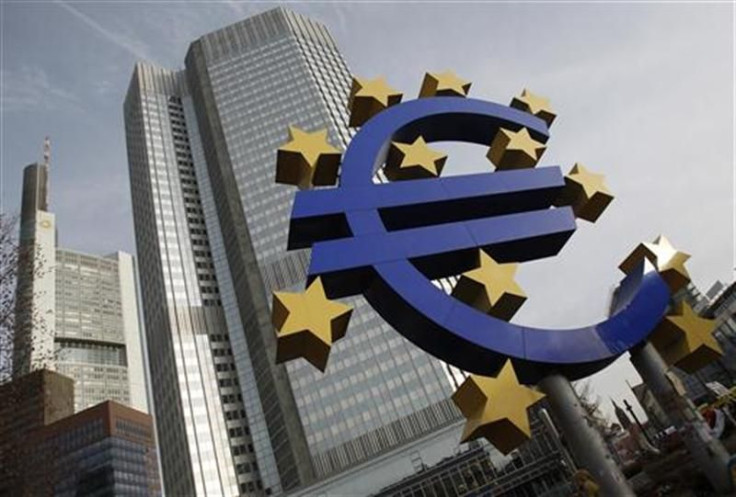Euro's Falling Value: A Solution To The Crisis, Or A Symptom?

A declining currency value could be a boon for Europe and a solution to the ongoing crisis, economists say.
While alarmed investors are beginning to purchase dollar-denominated bonds in droves, trade analysts are optimistic that a fall in the value in the euro will improve the trade balances of member nations by expanding global demand for European exports -- a move that will help bridge the gaping budget deficits in Spain, France, Italy and Portugal without taking a toll on incomes.
The euro plunged below $1.22 against the dollar to its lowest level in more than two years on Thursday. It rallied 0.3 percent to $1.2237 from Thursday's low of $1.2167, early Friday afternoon in New York, clipping its weekly loss to 0.4 percent. However, the 17-nation currency continues to spark concerns that global central banks will adopt more stringent monetary measures to weather the faltering European economy.
The euro is still overvalued, said Bernard Baumohl, global chief economist at the Economic Outlook Group, an analytics and economic forecasting firm based in Princeton, N.J. Many other analysts agree that a dramatic decline will save the economy.
ECB Rate Cuts
Last week, the European Central Bank (ECB) said that it would cut its deposit rate -- the rate paid by banks to park money with it overnight -- to zero and slash its benchmark lending rate to 0.75 percent. The announcement drove the euro currency down further and pushed euro zone bank-to-bank lending rates to new all-time lows on Friday as fund managers blocked new investments in European money market funds, while other investors pulled out of the euro region in panic.
Some economists say that the current rate cuts aren't enough to boost lending and breathe life into the sagging economy. The ECB would do well to bring its benchmark lending rate to a similar level as the Federal funds rate, which currently ranges between 0.15 percent and 0.18 percent, economists say. Even if such a move doesn't expand credit significantly, it would mitigate the effects of the debt crisis by pushing the euro value down radically and creating a robust global demand for European exports.
The ECB must reduce its interest rates (more) dramatically, Baumohl said. It should bring the rate down to near-zero levels like the Fed did.
Italy Debt Sale
Italy's borrowing costs fell at an auction where it sold bonds and securities for €5.25 billion ($6.42 billion) -- €3.5 billion ($4.28 billion) of three-year bonds and €1.75 billion ($2.14 billion) of three longer-dated securities -- hours after Moody's Investor Services downgraded its bond rating by two notches, citing a worsening political and economic outlook. The euro slide eased after Italy's debt sale.
However, it is premature to be confident about Italy's outlook, Baumohl pointed out. The country might have to borrow more than 35 million euro bonds to meet its obligations. It remains unclear whether private investors would be able or willing to buy its debt -- something that is necessary if private capital -- a key measure of economic prowess -- is to flow freely into Rome.
As borrowing costs continue to tend downward, there will be a greater flow of capital from private investors.
European Integration
Governments and investors are equally uncertain about whether the euro zone will disintegrate. Countries like Spain have been calling for an economic integration to save the euro.
Meanwhile, Germany, in the middle of the quagmire, is fighting hard to preserve the euro zone and reform it. That involves avoiding Greece's exit from the euro -- a possibility that German Chancellor Angela Merkel is worried about as that would mean going down in history as a leader who was responsible for a chaotic splintering of Europe, after half a century of economic integration in the region. Economists say that Merkel is going to have to provide more credit in euro bonds and take a final call about whether to integrate Europe or not.
European governments have been criticized for embracing severe austerity measures that have been futile to date. If that continues, the economic depression that follows will wreck disaster, economists say. Many agree that the woes in Europe can be brought to rest with implementing growth reforms rather than sudden and sharp austerity programs.
© Copyright IBTimes 2024. All rights reserved.





















